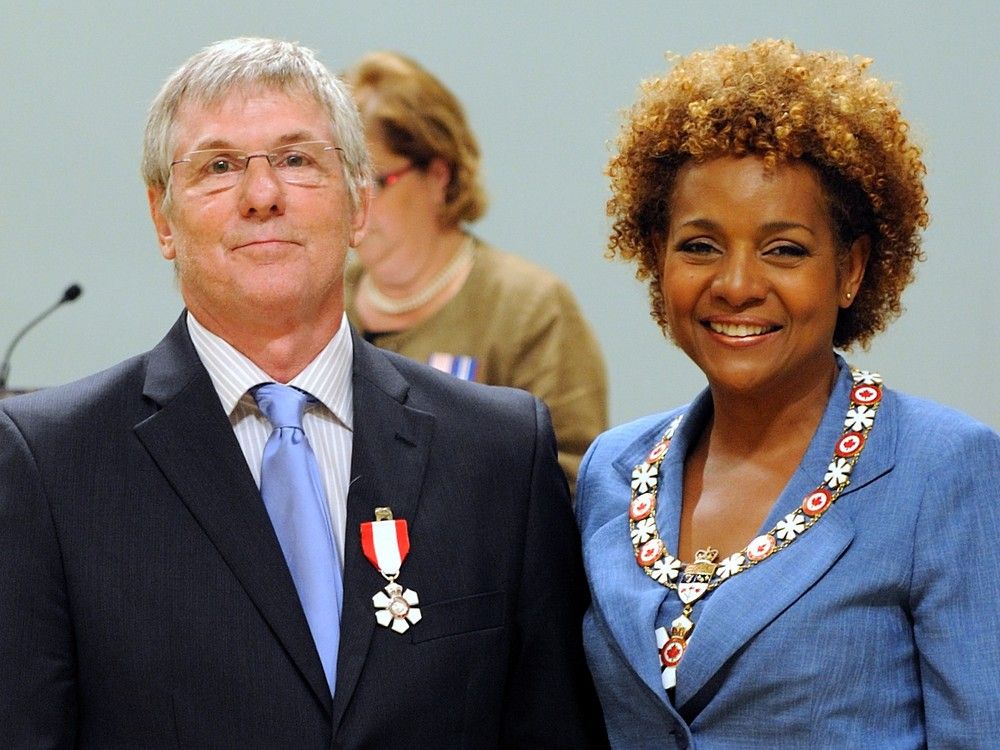
Less than two weeks after becoming a non-affiliated member of Canada’s Senate, New Brunswick Sen. David Adams Richards elected to join the Conservative Party of Canada’s caucus in Parliament’s Upper House this week.
The 74-year-old declined an interview with National Post, but an emailed statement illustrated an obvious frustration with both Justin Trudeau and Prime Minister Mark Carney’s Liberal Party of Canada.
“For years, so many of the concerns I and others had about our country were dismissed by an insular, self-absorbed government, with an almost blind indifference to ordinary men and women,” wrote Richards, an award-winning and celebrated Canadian writer.
“Now the Liberals are insisting on policies that certain senators pleaded for and who were so often ridiculed and refused.”
Richards didn’t elaborate on specific policies, but Conservative leader Pierre Poilievre said during the recent federal election campaign that Carney and the Liberals were
“plagiarizing” ideas from the Tory platform.
In a statement posted to X, Sen. Leo Housakos, newly acclaimed Leader of the Opposition in the Senate, welcomed Richards to a group “that is home to diverse opinions and healthy debate, consensus and cooperation, grounded in common-sense principles and committed to the important work of a robust and healthy opposition.”
BREAKING 🚨
“The Honourable Leo Housakos, Leader of the Opposition in the Senate, is pleased to welcome Senator David Adams Richards to the Conservative Senate Caucus.”
“L’honorable Leo Housakos, Leader de l’opposition au Sénat, est heureux d’accueillir le sénateur David Adams… pic.twitter.com/34HtgrN78A
— Senator Leo Housakos (@SenatorHousakos) June 3, 2025
Here’s what to know about Richards.
Richards the writer
Born in 1950, Richards was raised in New Castle, N.B., a suburb of Miramichi, where his parents operated a local movie theatre.
He’s married to Peggy McIntyre, with whom he has two sons, John Thomas and Anton Richards.
While his first published work after studying literature and philosophy at St. Thomas University in the early 1970s was a small book of poems, Richards became an acclaimed Canadian novelist with 16 titles on his resume, along with six non-fiction books and two collections of short stories.
His writings have been translated into 12 languages and are part of the curriculum of Canadian and U.S. universities, according to
In a style said to be influenced by the likes of Leo Tolstoy and compared to William Blake, his fiction work is mostly set in the Miramichi Valley where he grew up and the characters are inspired by the lives and experiences of its poor and working-class people.
“Through the characters of his fictionalized Miramichi, David Adams Richards explores conflicts between families with long community histories, the long-term consequences of errors in judgment, the complexity of making moral choices, and humanity’s unfortunate willingness to remember faults sooner than virtues,” per his
bio in the Canadian Encyclopedia.

Richards has been a writer-in-residence at multiple universities and colleges across Canada, three of which have awarded him honorary doctorates — the University of New Brunswick (1995), Mount Allison University in Sackville (2008), and St. Thomas University in Fredericton (1990). He received the same honour from the Atlantic School of Theology in 2010.
In 1998, he became one of just three Canadian writers to win a Governor General’s Literary Award in both fiction and non-fiction for Nights Below Station Street (1988) and Lines on the Water: A Fisherman’s Life on the Miramichi (1998). Writers Laura G. Salverson and Hugh MacLennan are the others. Meanwhile, his 1993 fiction novel For Those Who Hunt the Wounded Down and 2007’s The Lost Highway were also nominated for the government honour.
In 2000, his Mercy Among the Children was a co-winner of the Giller Prize along with Anil’s Ghost by Michael Ondaatje, the only time two recipients have shared the honour in its 31-year history. Lost Highway and The Friends of Meager Fortune (2006) were both longlisted for the Giller.
Richards has also been awarded two Gemini Awards for scriptwriting (Small Gifts and For Those Who Hunt the Wounded Down), the Alden Nowlan Award for Excellence in the Arts, the Canadian Authors Association Award for his novel Evening Snow Will Bring Such Peace, the 2011 Matt Cohen Award for a distinguished lifetime of contribution to Canadian literature and the Canada-Australia Literary Prize.
He is a member of the Order of New Brunswick (2005) and the Order of Canada (2009).
Richards the Senator
When
first appointed to the Senate by Trudeau in 2017
, two years after the then-prime minister established the Independent Advisory Board for Senate Appointments to make the Upper House less partisan, Richards joined the relatively new Independent Senators Group (ISG).
The cohort had come together the year prior, not as a political party, but to work together on procedural and administrative matters, and had quickly grown to be the largest group in the Senate at 43 members.
Its size is what led to his departure to sit as a non-affiliated senator.
“There was certainly a leaning toward government bills which I thought at certain times I didn’t completely support,” he told Jason VandenBeukel in
an interview for his doctoral thesis in political science from the University of Toronto.
“And so I decided I will be an independent and come to my own conclusions about things.”
Today I was pleased to preside over the swearing-in of the Hon. David Adams Richards to the @SenateCA. Welcome to the Upper Chamber. #SenCA pic.twitter.com/OGs3Z3i2fB
— George Furey (@GeorgeFureyNL) September 19, 2017
In November 2019, he was one of the founding members of the new Canadian Senators Group (CSG), which was established in part to address centralization within the Senate, particularly in the ISG, and to reinforce senators’ roles as regional representatives.
He remained with the second-largest ensemble in the upper house until May 21 this year, when he left to again sit as a non-affiliated member. He’s the only Liberal-appointed Senator to have joined the Conservative caucus, which now counts 12
s
enators.
As of Thursday, ISG leads the way with 45 members, CSG follows with 21, the Progressive Senator Group has 18, and there are eight non-affiliated. There’s one vacancy — the seat left behind upon Don Plet’s
mandatory retirement at the age of 75 earlier last month.
He’ll soon be joined in retirement by Richards, who turns 75 on Oct. 17.
In the Senate, Richards has been critical of Trudeau’s Liberal government at times, particularly regarding Bills C-11, the Online Streaming Act, and C-22, Ottawa’s controversial firearms legislation.
On the latter, in June of 2023,
to lament Canadians being lectured “by a government that assumes and presupposes a superior moral nature against certain members of its own citizenry, and acts with uppity condescension toward so many who have done no wrong, suspecting them — without evidence — of things they would not do, while being unable to stop those who will continue to do wrong despite the regulations they continuously and tiresomely propose.”

He voted against it, but C-21 would receive royal assent in December.
As for the Online Streaming Act, he called it “censorship passing as national inclusion” and then read from an essay explaining how it puts freedom of speech and thought under threat.
“This is not opening the gate to greatness but only to compliance,”
“The writers I know don’t need to advance to fit an agenda, and neither do the songwriters or bloggers. When this bill mentions how we have evolved, it is simply a suggestion to comply.”
It, too, received Royal Assent.
Years earlier, it wasn’t legislation that Richards fervently spoke out against; it was how the uninformed vernacular used by U.S. hockey play-by-play broadcasters was changing how their Canadian counterparts call a game.
Reading from a statement, he said players don’t wear jerseys, they wear sweaters, and they put them on in the dressing room, not the locker room. There’s no such thing as a half wall, he insisted, it’s just the boards. And don’t call it a slapper, it’s a slapshot.
“These odious phrases are all momentary inventions by American play-by-play announcers who have never played or understood the game, and worse, almost sacrilegious, have no respect for millions of Canadians who do understand and love the game. Sayings now adopted by Canadians who have no sense of tradition,” Richards said.
“The first thing lost is the game’s essential genius.”
Our website is the place for the latest breaking news, exclusive scoops, longreads and provocative commentary. Please bookmark nationalpost.com and sign up for our daily newsletter, Posted, here.
